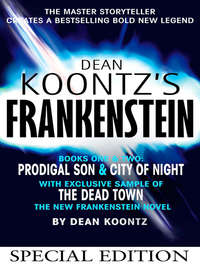![You Are Destined To Be Together Forever [an Odd Thomas short story]](/covers_330/39794313.jpg)
Полная версия
You Are Destined To Be Together Forever [an Odd Thomas short story]



Copyright
Harper
An imprint of HarperCollinsPublishers Ltd
77–85 Fulham Palace Road
Hammersmith, London W6 8JB
www.harpercollins.co.uk
First published by HarperCollinsPublishers 2014
First published in the USA in 2014 by Bantam Books,
an imprint of The Random House Publishing Group,
A division of Random House, Inc., New York.
Copyright © Dean Koontz 2014
Cover design layout © HarperCollinsPublishers 2014
Cover design © Scott Biel
Cover images: (man) Claudio Marinesco; (woman) © Stephen Carroll/Trevillion Images
Dean Koontz asserts the moral right to be identified as the author of this work
A catalogue record for this book is available from the British Library
This is entirely a work of fiction. The names, characters and incidents portrayed in it are the work of the author’s imagination. Any resemblance to actual persons, living or dead, events or localities is entirely coincidental.
All rights reserved under International and Pan-American Copyright Conventions. By payment of the required fees, you have been granted the non-exclusive, non-transferable right to access and read the text of this e-book on-screen. No part of this text may be reproduced, transmitted, down-loaded, decompiled, reverse engineered, or stored in or introduced into any information storage and retrieval system, in any form or by any means, whether electronic or mechanical, now known or hereinafter invented, without the express written permission of HarperCollins.
Ebook Edition © DECEMBER 2014 ISBN: 9780008115487
Version: 2014-12-02
Contents
Cover
Title Page
Copyright
Chapter One
Chapter Two
Chapter Three
Chapter Four
Chapter Five
Chapter Six
About Dean Koontz
By Dean Koontz
About the Publisher
One
My four-hundred-pound friend and mentor, P. Oswald Boone, the famous mystery writer, says that although he has in his refrigerator cheeses older than I am, sixteen is not too young to write worthwhile prose, as long as I write about what I know, which in my case means a girl named Stormy Llewellyn, the ghost of Elvis Presley, brutal murder, and revenge from beyond the grave.
In late May, the annual spring fair had come to Pico Mundo, California, where I had lived all my life, on the edge of the Mojave Desert. On Friday, I borrowed Terri Stambaugh’s car so that I could take Stormy to the carnival that had set up its many attractions on the fairground midway. Terri was my boss, the owner of the Pico Mundo Grille, where I worked as a fry cook twenty-four hours each week during the school year, forty hours each week during the summer.
I couldn’t borrow a car from my father, because he had walked out on us years earlier. I couldn’t borrow a car from my mother, because such a request would stress her. When stressed, Mother made veiled references to suicide, and sometimes she retrieved the pistol from the nightstand drawer in her bedroom, caressing its contours with more affection than she’d ever shown me. When I was a child, which was a shorter period of time for me than it was for most people, my mother sometimes implied that she might take me with her if she decided to consummate her romance with Death. My mother is beautiful, and to anyone who never lived with her, she seems to be a genteel and pleasant lady, if slightly aloof. I moved out when I turned sixteen, into a tiny apartment above a garage, which I pay for by mowing the lawn and doing general maintenance chores for my landlady.
At 4:30, Stormy met me behind the Grille, where Terri’s Mustang was parked. “Hey, odd one. You look better than a stack of your best pancakes.”
“I take that as a compliment.”
“As it was intended.”
We kissed. It wasn’t a wild, passionate kiss, but tender and sweet. In the matter of passion, she wanted to go slow, and I wanted whatever she wanted.
She had been orphaned at seven, when her parents died in a plane crash. After that, for a time, she had been an abused child, a victim of her adoptive parents. In spite of all that she had suffered, the world had not broken her.
With jet-black hair, a Mediterranean complexion, and mysterious dark eyes, she was straight out of a dream about an Egyptian queen regarded as a demigoddess by her subjects, which is how I would have regarded her if she wouldn’t have punched me for daring to put her on a pedestal. Stormy Llewellyn didn’t want a pedestal. She wanted only someone who would look her straight in the eyes and always tell her the truth.
As I opened the passenger door of the Mustang for Stormy, I said, “Mr. Presley is in the backseat.”
“Elvis?”
“I thought you should know. Though he can’t speak, he can hear whatever we say.”
Stormy got into the car and looked behind her seat, but of course she couldn’t see the King of Rock ’n’ Roll because he had been dead for years, in fact, for decades, and it was only his spirit that was going with us to the carnival.
Most people leave the world when their bodies die. Some spirits linger, reluctant to cross over to the Other Side. They come to me because they know that I can see them and that I will help them if I can. Sometimes they want their murders avenged. Mr. Presley wasn’t murdered—except by numerous movie critics when he was alive. But he, like some others, seemed to be afraid of what might await him in the Great Beyond.
He had been hanging out with me for some months, though he made no effort to explain himself. The dead don’t talk. I don’t know why. But they have ways of conveying their concerns and desires. Mr. Presley seemed content just to keep me company.
As I got behind the wheel of the Mustang, Stormy said, “What’s he wearing this time?”
“That ridiculous Arab getup from Harum Scarum. Sorry, sir, but it is ridiculous.”
All other lingering spirits that I had known were limited in their wardrobe to the clothes they had been wearing when they died. Mr. Presley, however, was capable of manifesting in anything he had worn during his storied career. He tended to avoid the flashy Vegas costumes that made him look like a less-well-coiffed Liberace.
Glancing over my shoulder, I saw that he had in an instant changed from the Harum Scarum garb to the flamenco-dancer costume that he had worn in Fun in Acapulco: tight black tuxedo pants, a two-thirds-length black jacket, and a ruffled white shirt with an elaborate black foulard at the throat.
“Better,” I said.
He made a gun of his thumb and forefinger, pointed it at me, and winked.
You might wonder why Stormy Llewellyn would believe I can see spirits. She’s a practical girl with a commonsense plan for her future. She works part-time behind the counter at Burke & Bailey’s in the mall, scooping ice cream and mixing milkshakes. She intends to be an ice-cream entrepreneur with her own shop by the time she’s twenty-four and to build a chain of six stores by the time she’s thirty. She is already saving half her wages toward the financing of that plan. Stormy is not the kind of sixteen-year-old girl who believes everything—or anything—I say just because I’m her guy.
I’m her guy. I can’t tell you how deeply it pleases me to write those three words. My father’s a mess, my mother’s psychotic, I’m a fry cook without his own car, a geek who lives in one room and a bath above a garage, and I see dead people and worse. She’s the coolest girl in school, and every guy who sees her stands awestruck, with his tongue hanging out. Nevertheless, I’m her guy, me and no one else, maybe because I’m able to keep my tongue in my mouth when I look at her and because I can make her laugh.
Anyway, she believes in my paranormal abilities because she’s had some experiences in my presence that confirmed them. For example, she was with me when an angry poltergeist destroyed my brand-new stereo system for no good reason. And Wyatt Porter, chief of police, has vouched for me, because I have shared my prophetic dreams with him and have given him other paranormally obtained information that has helped him close cases. Only the chief and his wife, Stormy, Ozzie Boone, and Terri Stambaugh know about my sixth sense, and they all protect me from discovery by others.
Now, as I drove the Mustang along the alleyway behind the Pico Mundo Grille, Stormy said, “Maybe Elvis doesn’t want to leave this world because so many people loved him here. The day of his funeral, over fifty thousand gathered at the gates to Graceland.”
“Guess you’ve been talking to Terri,” I said. My boss at the Grille was an obsessive Elvis fan, though she was fifteen when he died, and he was even then long past his prime.
“The lines waiting to view him in his casket totaled two miles,” Stormy said.
Mr. Presley had come forward from the backseat, leaning over the console to see Stormy’s face.
She said, “They needed one hundred vans and four hours to move all the flowers from the funeral at Graceland to the cemetery for the graveside service.”
As I braked at the end of the alley, I glanced at Mr. Presley, and he looked at me, and in his spirit eyes were spirit tears. He had always treated his fans with respect until the last few years, when his drug use and health problems prevented him from giving them the high-quality performances for which they had paid.
We rode in silence for a block or so, and then Stormy said, “Eighty cops and forty sheriff’s deputies weren’t enough to control the grieving crowd. The governor had to call up thirty National Guardsmen to assist them.”
Mr. Presley slipped once more into a corner of the backseat, gazing out a side window, clearly distraught.
At a red traffic light, I stopped and glanced at Stormy, aware that she was up to something with all those funeral details.
She met my eyes but spoke loud enough to be sure that my other passenger heard her. “Maybe he doesn’t want to leave this world because so many people loved him here,” she said again, but then she added, “or…or maybe he’s embarrassed by how his life spun out of control, and he’s afraid to cross over and face those fans who adored him but saw how he spiraled down in the end. It can be tough to be idolized by millions and even tougher if you can’t live up to the image they have of you.”
I wasn’t surprised by her bluntness. She was, after all, Stormy Llewellyn. Llewellyn is a variant of Leo, which comes from the Greek leon, meaning “lion” and implying abundant strength of character and will and physique, all of which applied to her. And you know what stormy means. Although not surprised, I did feel some sympathy for Mr. Presley, and I said, “That was a little hard.”
“Tough love,” she said.
And of course what she’d told him was at least as much love as it was tough. He had died in 1977. Rare is the spirit who lingers here so long after death. He needed to understand and accept the reason that he had not yet moved on; and whatever words were required to bring him to his senses, even if tough, would be a kindness.
Instead of responding to what Stormy said, Mr. Presley did a little mime routine, first boring vigorously in his nose with one finger, then pretending to reel from his nostril a few yards of snot.
“How’s he taking it?” Stormy asked.
“Immaturely.”
Mr. Presley rolled the imaginary snot into a wad the size of a baseball and threw it at me.
A horn honked behind us. The light had changed. Nevertheless, I delayed long enough to pretend to catch the hideous but nonexistent ball of mucus and throw it over my shoulder, back at him, before I accelerated across the intersection.
“What was that about?” Stormy asked.
“Snotball.”
“Again?”
“He always was a big child at heart.”
You might think that the presence of the lingering dead would make of my life a solemn if not even sorrowful affair, grim and dark and shot through with fear. It is at times grim and dark and shot through with fear—when it’s not silly, amusing, and shot through with foolishness.
We had traveled a few miles and were in that area where Maricopa Lane passed from suburban neighborhoods into a semirural landscape, when a man with a meat cleaver embedded in his neck came out of nowhere and dashed in front of the car. Even if I had been driving the Batmobile, with its ability to stop on a dime and give six cents in change, I couldn’t have avoided hitting the guy. Anyway, braking didn’t matter, which I knew because of Stormy’s failure to cry out in alarm. I drove through the spirit as he pointed at me. With the nimble grace of the lingering dead, he passed through the front of the car, boarding the vehicle at fifty miles per hour, folded to a sitting position, and settled into the backseat, beside Mr. Presley, the laws of physics no longer applicable to him.
Конец ознакомительного фрагмента.
Текст предоставлен ООО «ЛитРес».
Прочитайте эту книгу целиком, купив полную легальную версию на ЛитРес.
Безопасно оплатить книгу можно банковской картой Visa, MasterCard, Maestro, со счета мобильного телефона, с платежного терминала, в салоне МТС или Связной, через PayPal, WebMoney, Яндекс.Деньги, QIWI Кошелек, бонусными картами или другим удобным Вам способом.









